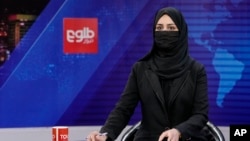Female program presenters in Afghanistan went on the air Sunday with their faces covered to comply with a fresh decree by the country’s Islamist Taliban rulers.
Since seizing power nine months ago, the male-only interim Taliban government has subjected women and girls to a series of onerous curbs, drawing international criticism.
Last week, the Ministry of Vice and Virtue, charged with interpreting and enforcing the Taliban’s version of Islamic Sharia law, ordered all Afghan television channels to ensure that female presenters start covering their faces while on screen.
On Sunday, female presenters and journalists aired news bulletins across leading channels, including TOLO news, Ariana Television, Shamshad TV and 1TV, wearing full hijabs and face-covering veils that left only their eyes in view. The Taliban had previously required women presenters to wear a headscarf.
Female staff at the TOLO news said they had initially resisted covering their faces, but the Taliban pressured their employer, asking them to remove those who defy the order.
Khpolwak Sapai, the TOLO news deputy director, said his channel was told to strictly follow the Taliban order and force staff to comply with it.
"I was called on the telephone yesterday and was told in strict words to do it. So, it is not by choice but by force that we are doing it,” Sapai said.
Male colleagues at TOLO news also wore face coverings in solidarity with female staff.
“We are in deep grief today,” Sapai lamented in a social media post.
Afghan TV channels have already been barred from broadcasting dramas and soap operas featuring women.
The Vice and Virtue ministry spokesman dismissed media claims, however, that the Taliban were against women presenters working in the channels.
"We have no intention of removing them from the public scene or sidelining them or stripping them of their right to work," said Mohammad Akif Sadeq.
Earlier this month, the Taliban decreed that Afghan women must wear head-to-toe garments covering their faces when in public. Male guardians of those not complying with the decree could be sentenced to jail for three days or more.
The edict empowers authorities to fire women government employees if they fail to follow the dress code while male staff also risk suspension from work if their female relatives fail to comply.
The Taliban have told most women not to return to their workplace or undertake long road trips unless accompanied by a close male relative. Secondary school girls over the age of 12 have not been allowed to resume classes.
The crackdown on women’s rights has outraged Afghan activists and the international community. Even leaders within the Taliban have begun questioning some of the restrictions, including those related to female education, underscoring growing internal rifts.
The Taliban have defended the measures as in accordance with Afghan culture and Islamic tradition, a position repudiated by some Islamic law scholars who say the gender-specific dress codes are inspired only by rural Afghan norms.
But in a rare public criticism of his government women-related policies, Sher Mohammad Abbas Stanikzai, a central Taliban leader and deputy foreign minister, said Sunday Afghan women have not yet been given their due rights. His remarks underlined persistent internal rifts on the level of access women should have to education and work.
“No one has yet given women the right to education. Where will women go to learn Islam and Shariat? Obviously, they will learn it in schools and seminaries,” Stanikzai told a big gathering of Taliban leaders in the capital, Kabul.
“Half of Afghanistan’s around 40 million population are women. Women must be given the rights, which the Almighty, the holy Prophet and our Afghan culture have given them,” said the Taliban leader, who negotiated the February 2020 troop withdrawal pact with the U.S.
During two decades of the U.S.-led foreign military intervention in Afghanistan, which ended last August with the return to power of the Taliban, women and girls had made marginal gains in the deeply patriarchal South Asian nation.
Tom West, the U.S. special envoy for Afghanistan, and Rina Amiri, U.S. envoy for Afghan women, girls and human rights, spoke to Taliban Foreign Minister Amir Khan Muttaqi on Saturday to convey “unified international opposition to ongoing expanding” curbs on women’s role in society.
“Girls must be back in school, women free to move & work w/o restrictions for progress to normalized relations,” West posted on Twitter while sharing details of the discussions.
West said the dialogue with the Taliban will continue “in support of Afghan people and our national interests.”
Amiri wrote on Twitter that she had raised U.S. concerns regarding the dissolution of several rights bodies by the Taliban and stressed that “this contradicts demands of Afghans for greater accountability & needs to be remedied.”
Last week, the Taliban dissolved the Afghanistan Independent Human Rights Commission (AIHRC) and four other bodies protecting rights of Afghans, saying they were not needed anymore in the face of a $500 million annual budget shortfall.
The international community has not recognized the new Taliban government. It requires the Islamist group to deliver on its pledges to fight terrorism, rule the country inclusively and uphold the rights of all Afghans, including those of women, before considering Kabul’s calls for granting it diplomatic legitimacy.
Information from AFP was used in this report




